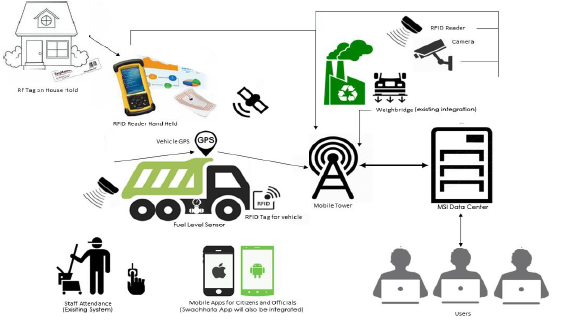By use of a smart waste management system, garbage collecting may be greatly improved, environmental impact can be lowered, and city cleanliness can be enhanced. Still, there is always room for improvement, even in this system. That said, these are some main guidelines to guarantee the effective application of these systems.

1. Right Sensor Positioning
To gather reliable data, make sure sensors are placed in the right positions—near often-used bins in public spaces. Good sensor placement helps the system to efficiently measure fill levels and send garbage collecting teams only when required, therefore saving resources and lowering emissions.
2. Monitoring the Data
Review the data the sensors and software of the system offer. Many smart waste management systems detect bin fill levels, temperature, and location, so providing information on waste trends and patterns. With this information, you may modify the frequency of collections and project waste surges during events, as well as make wise decisions that simplify processes.
3. Use dynamic routing.
Build dynamic collecting paths using the system’s data-driven insights. Collection vehicles can be sent to locations where bins are almost full instead of adhering to set plans. This lessens the carbon impact related to rubbish collecting, lessens road congestion, and helps to slash gasoline expenses.
4. Work with Other Smart City Systems
Combine your waste management system with other smart city technologies, such as IoT traffic control and energy systems. This helps to provide a whole picture of city operations, thus possibly increasing efficiency even further by timing waste-collecting activities with low-traffic times, thus reducing disturbance.
5. Schedule Frequent Maintenance
Check and maintain the sensors, communication tools, and system software regularly. Inaccurate readings or data loss resulting from malfunctioning equipment could compromise the effectiveness of the system. Planned maintenance guarantees that the system keeps running as best throughout time.
6. Educate the People
As you explain the advantages of smart waste management, encourage locals to utilize waste bins suitably. Understanding the goal of the system helps the public to engage, so littering is reduced and the general efficiency of the system is increased.
Summing it up
Following these guidelines will help cities and businesses maximize the effectiveness and advantages of their smart waste management systems, therefore producing better surroundings and more sustainable urban living
Sources Referred: https://www.smartcitiesdive.com/news/how-smart-waste-management-systems-can-improve-urban-collection/613195/